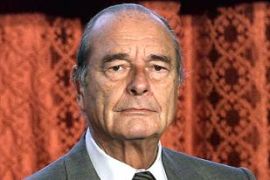Profile: Jacques Chirac
The outgoing French president leaves a legacy of strong, symbolic gestures, but meagre results.

But his critics say he has little meaningful economic or social reform to show for his time in charge.
“Overall … it’s seen as a very weak presidency, especially in the second term,” said Daniela Schwarzer, an expert on France at the German Institute for International and Security Affairs.
Civil servant
Chirac’s early career was in the civil service, while politically he joined the French Communist Party in the 1950s, and became a senior aide to President Georges Pompidou in 1962.
It was Pompidou who suggested that Chirac stand for the National Assembly as a Gaullist in 1967, and he entered government via the ministry for social affairs and then went to the economy ministry.
His first top level post came in 1972 when he became agriculture minister; two years later he moved to be interior minister but within months he was appointed as prime minister by new president, Valery Giscard d’Estaing.
During this time he visited Saddam Hussein in Iraq and oversaw the deal for France to sell Saddam the controversial Osirak nuclear reactor, which was later bombed by Israel.
Chriac resigned as prime minister in 1976 and was elected mayor of Paris, although he interrupted this to serve again as prime minister to President Francois Mitterrand in 1986-88.
With Mitterrand ill in 1995, Chirac stood for the presidency and won, having been unsuccessful in 1981 and 1988.
Policy changes
| “Overall … it’s seen as a very weak presidency especially in the second term” Daniela Schwarzer, an expert on France at the German Institute for International and Security Affairs.
|
During his 12 years as president, Chirac ended compulsory military service, stood firm against the increasingly popular far right and was the first president to acknowledge that France‘s Vichy regime had assisted the Nazis in World War II.
He also played an important role in ending the civil war in Yugoslavia in the 1990s and won widespread popularity in the Arab world for the way he stood up to George Bush, the US president, over the invasion of Iraq in 2003.
But he also suffered some spectacular reverses – notably in 2005 when the French voted in a referendum to reject the European Union constitution, diminishing his domestic standing and weakening his position as a major international player.
His career was marked by policy changes, which won him the nickname the ‘Chameleon Bonaparte’ or ‘La Girouette’ (The weathervane).
At one point, he fiercely opposed the EU, then supported it; he used to champion US-style free-market economics, then promoted protectionism.
Others nicknamed him ‘Houdini’ because of his ability to find a way out of difficult situations, while President Georges Pompidou referred to him simply as the “bulldozer” for his ability to get things done.
Popular figure
Energetic, engaging and passionate for power, Chirac has been at the
|
“As soon as he sees a fast-food place, he has to stop the car, rush up to the counter, and order a hamburger” Alain Juppé, a former prime minister of France |
centre of French politics for nearly half a century and has had dealings with every world leader since Leonid Brezhnev ruled the Soviet Union.
Despite many ups and downs, he has remained a popular figure with a solid base of affection.
A poll once said he was the politician most French people would like to have dinner with.
Despite the serious burdens that Chirac shouldered as French president, he embraced the lighter side of life and had a penchant for Americana that probably began in 1953 when he travelled to the United States and attended summer courses at Harvard.
To help support himself, the 20-year-old Chirac worked as an ice cream soda maker and dishwasher in a Howard Johnson’s restaurant.
The New York Times, speaking of Chirac’s common touch, reported: “He prefers a cold Mexican beer to a glass of wine, and a genuine American meal like a hot turkey sandwich with gravy to a pseudo-Escoffier meal.”
Chirac’s habit of frequenting fast-food restaurants led Alain Juppé to joke in Time, “As soon as he sees a fast-food place, he has to stop the car, rush up to the counter, and order a hamburger.”
On other occasions he has used food as a political weapon, and once said of the British: “One cannot trust people whose cuisine is so bad”, although he said Finland had the worst food in Europe.